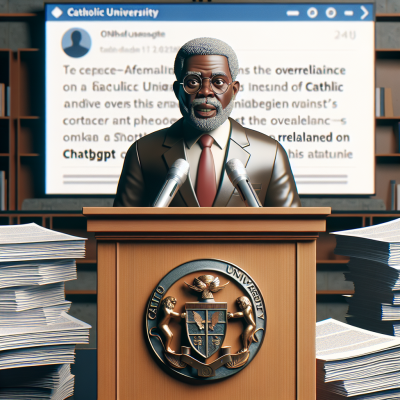
Professor Moto Warns Students Against Over-Reliance on AI Tools
In a compelling reminder about the essence of true education, Professor Francis Moto, Vice-Chancellor of the Catholic University of Malawi (CUNIMA), recently cautioned students about depending heavily on artificial intelligence tools like ChatGPT when completing academic assignments. His comments underscore growing concerns among academic institutions worldwide – are students trading genuine learning for convenience?
Understanding Before Applying: A Message to Students
During a powerful address to students, Professor Moto emphasized that academic qualifications should not only be earned but also understood and internalized. He expressed concern over students passing their courses using AI-generated responses without fully grasping the learning material.
“Some of you write your assignments using ChatGPT and pass, but on your graduation day, we will celebrate your achievement. Please, understand that the real world will challenge the value of that qualification,”
Professor Moto stated, pointing out the stark contrast between academic success and real-world applicability.
Maintaining the Integrity of Higher Education
CUNIMA continues to uphold rigorous education standards aimed at preparing students for the demands of the professional world. The Vice-Chancellor reiterated the institution’s commitment to ensuring that its graduates are not only qualified on paper but also industry-ready and ethically grounded.
The Challenge of Artificial Intelligence in Academia
Since the emergence of ChatGPT by OpenAI in 2022, AI tools have evolved rapidly, captivating users across multiple sectors with their ability to mimic human conversation and generate informative text. Yet, with great power comes great responsibility.
While ChatGPT can:
- Assist with brainstorming ideas
- Improve grammar and phrasing
- Provide educational overviews on various subjects
…it also poses several risks:
- Inaccurate or misleading content: AI doesn’t always offer factually correct information.
- Lack of source reliability: Many responses don’t cite academic or credible references.
- Ethical justifications: Passing off AI-generated work without attribution raises integrity concerns.
Global Religious Perspective on AI
The concerns expressed by Professor Moto echo a broader conversation occurring worldwide. On January 27, 2025, the Vatican’s Dicastery of Faith and Dicastery of Education and Culture jointly released a document titled Antiqua et Nova, offering guidance on the responsible use of AI technology.
This Papal document not only encourages ethical engagement with AI tools but also calls for comprehensive governmental regulation to guard users—especially the youth—from potential exploitation or dependency.
Striking the Balance Between Technology and Learning
AI is undeniably transforming the educational landscape. However, in the rush to implement new tools, there’s a growing risk that students may prioritize speed and ease of use over depth of understanding and critical thinking.
Professor Moto’s advice aims to remind students that education is not just about earning a certificate but becoming a competent member of society who can think, analyze, and decide independently.
Key Takeaways for University Students
- Use AI tools like ChatGPT as supplementary resources, not as primary authors of your work.
- Focus on understanding your course content—there are no shortcuts in meaningful learning.
- Stay informed about the ethical use of technology in education.
- Respect academic integrity policies outlined by your institution.
Conclusion: A Call for Responsible Learning
As artificial intelligence continues to influence how we interact with information, Professor Moto’s timely remarks serve as a critical reminder to aspiring graduates: True qualification stems from genuine understanding. While AI platforms like ChatGPT can be integrated into the learning process, the onus remains on the student to embrace education with integrity, commitment, and purpose.
Educational institutions like the Catholic University of Malawi are not simply issuing degrees—they are cultivating thinkers, problem-solvers, and leaders. And that, as Professor Moto reminds us, cannot be replaced by technology alone.


Leave a Reply